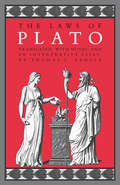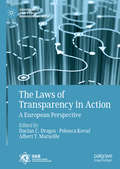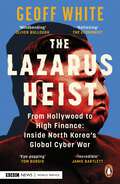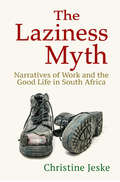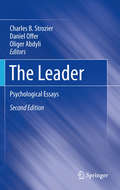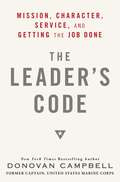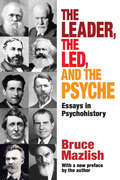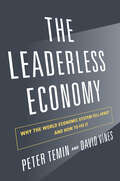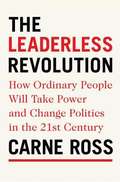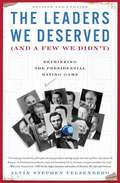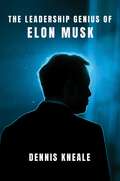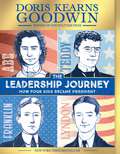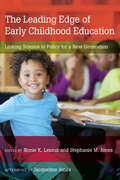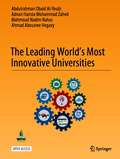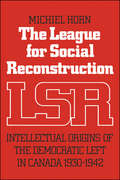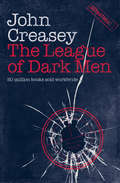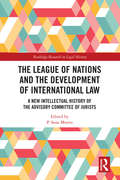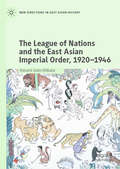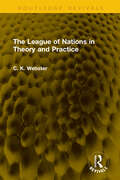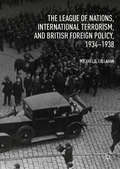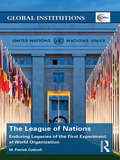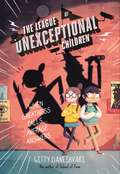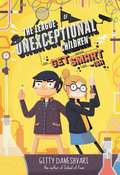- Table View
- List View
The Laws of Globalization and Business Applications
by Pankaj GhemawatThe Laws of Globalization and Business Applications employs a variety of empirical methodologies to establish two broad regularities that apply to international activity at the firm, industry, and country levels - the law of semiglobalization and the law of distance - and explores some of their implications for business. Part I presents evidence in support of the law of semiglobalization at the country and the business levels historically and up to the present. Part II performs an analogous function regarding the second law of globalization, showing that the gravity models that international economists have used to analyze merchandise trade between countries also apply to other types of international interactions - and at the industry and firm levels as well. Part III applies these laws to various challenges and opportunities that distance along various dimensions presents to multinational firms. A free online appendix provides additional data, analysis, and documentation to support research applications.
The Laws of Plato
by Plato Thomas L. PangleThe Laws, Plato's longest dialogue, has for centuries been recognized as the most comprehensive exposition of the practical consequences of his philosophy, a necessary corrective to the more visionary and utopian Republic. In this animated encounter between a foreign philosopher and a powerful statesman, not only do we see reflected, in Plato's own thought, eternal questions of the relation between political theory and practice, but we also witness the working out of a detailed plan for a new political order that embodies the results of Plato's mature reflection on the family, the status of women, property rights, criminal law, and the role of religion and the fine arts in a healthy republic. "Because it succeeds in being both literal and comprehensive, it is by far superior to any translation available. By reproducing dramatic detail often omitted, such as oaths, hesitations, repetitions, and forms of address, Pangle allows the reader to follow the dialogue's interplay between argument and dramatic context. . . . Pangle's translation captures the excitement and the drama of Plato's text. "--Mary P. Nichols, Ancient Philosophy "Pangle's achievement is remarkable. . . . The accompanying interpretive essay is an excellent distillation of a dialogue three times its size. The commentary is thoughtful, even profound; and it amply demonstrates the importance of reading Plato carefully and from a translation that is true to his language. "--Patrick Coby, American Political Science Review
The Laws of Transparency in Action: A European Perspective (Governance and Public Management)
by Dacian C. Dragos Polonca Kovač Albert T. MarseilleThis book examines the issue of free access to information as part of the openness and transparency principles. The free access to public information has become one of the most hotly contested aspects of contemporary government and public administration. Many countries in Europe have well-established Freedom of Information laws (FOIAs), while others have adopted them more recently. The problems that occur in the implementation of FOIAs are different due to the legal and institutional context; nevertheless, patterns of best practices and malfunctioning are comparable. The book analyses in comparative and empirical perspective the respective main challenges. Whilst the existing literature focusses on the legal provisions, this book offers practical insights through 13 national profiles and the EU level, on how effective the legal provisions of FOIAs really prove to be.
The Lazarus Heist: Based on the No 1 Hit podcast
by Geoff WhiteBASED ON THE NO 1 HIT PODCAST: THE LAZARUS HEIST They have been accused of causing mayhem in Hollywood with 2014's infamous Sony hack.They're allegedly behind WannaCry, a cyber-attack which brought the NHS to a dangerous standstill.And it has been claimed that they have stolen more than $ 1bn in an international crime spree.They are the Lazarus Group, a shadowy cabal of hackers accused of working on behalf of the North Korean state.From the streets of Dhaka to the casinos of Macau to the secretive capital of Pyongyang, this shocking story uncovers the secret world of the Lazarus Group, their victims and those who have tried - and so far, failed - to stop them.'Madly intriguing' Guardian'You'll never see North Korea the same way again' Oliver Bullough, Moneyland'One of the most incredible cyber-espionage stories I've ever heard' Jamie Bartlett, The Missing Crypto Queen'Pacy and eye-popping' Tom Burgis, Kleptopia
The Laziness Myth: Narratives of Work and the Good Life in South Africa
by Christine JeskeWhen people cannot find good work, can they still find good lives? By investigating this question in the context of South Africa, where only 43 percent of adults are employed, Christine Jeske invites readers to examine their own assumptions about how work and the good life do or do not coincide. The Laziness Myth challenges the widespread premise that hard work determines success by tracing the titular "laziness myth," a persistent narrative that disguises the systems and structures that produce inequalities while blaming unemployment and other social ills on the so-called laziness of particular class, racial, and ethnic groups. Jeske offers evidence of the laziness myth's harsh consequences, as well as insights into how to challenge it with other South African narratives of a good life. In contexts as diverse as rapping in a library, manufacturing leather shoes, weed-whacking neighbors' yards, negotiating marriage plans, and sharing water taps, the people described in this book will stimulate discussion on creative possibilities for seeking the good life in and out of employment, in South Africa and elsewhere.
The Leader
by Charles B. Strozier Daniel Offer Oliger AbdyliThis volume examines the lives of prominent leaders from ancient Greece to the present. It explores how these leaders imposed their individual missions and mystiques on others, thereby fulfilling , and sometimes creating, distinct needs in their followers.
The Leader's Code: Mission, Character, Service, and Getting the Job Done
by Donovan CampbellWhat does it take to be a great leader? In a word: character. This unique book by decorated U.S. Marine Corps veteran Donovan Campbell, the New York Times bestselling author of Joker One, draws on his years of training and combat experience to reveal the specific virtues that underpin effective leadership--and how anyone can stand up, serve others, and make a difference in the world by bringing out the best in a team. The Leader's Code is a practical action plan that can be applied to any situation in which exemplary leadership is required, whether that be at home or in the workplace. Moreover, The Leader's Code unpacks the military servant-leader model--a leader must take care of his mission first, his team second, and himself a distant third--and explains why this concept of self-sacrifice is so needed in today's world. Focusing on the development of character as the foundation of servant-leadership, Campbell identifies character's six key attributes: humility, excellence, kindness, discipline, courage, and wisdom. Then, drawing on lessons from his time in the Corps and stories from history, Scripture, and American business, he shows us how to develop those virtues in order to take the helm with confidence, conviction, and a passion to bring out the best in others. Being a leader is about being worthy of being followed. True leaders, Campbell argues, foster compassion for others and they pursue excellence in all that they do. They are humble and know how to self-correct. Campbell's exploration of these vital qualities is wide-ranging, as he takes us from the boardrooms of the world's most successful companies to the Infantry Officer Course, the intense twelve-week training gauntlet that Marines use to prepare their leaders to sacrifice themselves for the welfare of others. With faith in our political and business leaders at an all-time low, America is in the midst of a crisis of trust. Yet public opinion polls show that there is one institution that still commands widespread respect because of its commitment to character and sacrifice: the United States military. The Leader's Code shows that this same servant-leader model can help us all become our best selves--and provide a way forward for our nation.Advance praise for The Leader's Code "A refreshing model for leadership, offering convincing principles and motivating examples that are sure to make a difference in a leader's personal and professional life. I can't remember a leadership book that has had more influence on my thinking."--Steve Reinemund, dean of business, Wake Forest University, and retired chairman and CEO, PepsiCo "Donovan Campbell has written a superb, thoughtful, all-encompassing examination of leadership and leaders. His key lessons, easily understood and well articulated, are applicable at home, within the community, and to professionals in all walks of life. The Leader's Code is an important book for anyone concerned about today's leadership crisis in our country and in our communities."--General Mike Hagee, USMC (Ret.), 33rd Commandant of the U.S. Marine Corps "Donovan Campbell nails it as he speaks to our country's need for leadership at every level: at home, in the marketplace, in education, in government, and in the military. The Leader's Code is a clear call to be focused on the right mission, in the right way, and at the right time. This is a thoughtful book that will keep you awake at night and challenge you to dream in the daytime!"--Dennis Rainey, president and CEO, FamilyLifeFrom the Hardcover edition.
The Leader, the Led, and the Psyche: Essays in Psychohistory
by Edward AlexanderIn this book of absorbing stories, Bruce Mazlish illuminates the lives of intellectual and political leaders with the penetrating light of psychohistory and in doing so illuminates our own lives as well. A pioneer in this field, Mazlish demonstrates that study of the origins of leaders—their personal history—can help us understand their work, and that only in a study of their context, can we grasp their impact on events.Mazlish brings the insights of psychoanalysis to bear on a wide spectrum of leaders, beginning with those who created the theories of psychoanalysis: Darwin, who began to uncover the story of the human species; Freud, whose theory of individual behavior was rooted in Darwin's evolutionary biology; and Nietzsche, whose philosophy can be seen as a precursor to Freud. He studies intellectual leaders whose work stimulated political change: Marx, who inspired a revolution and "a great secular religion"; Thoreau, who fantasized independence within a dependent life; Jevons, whose economic theories reflected a private tension between ambition and duty; and Weber, a man of reason and passion, whose theories emerged from personal traumas.A section on political leadership examines polar opposites: the raging mystic but opportunist Khomeini; and Orwell, whose hatred for totalitarianism was less fierce than his passive fear. A final section on the psychohistory of groups focuses on the United States, exploring the polarities of American life, its light-dark dichotomies. Mazlish finds that these ambivalences explain "the American psyche"—from the Puritan's melancholy conscience and Washington's sense of parental betrayal that compelled a break with the father-mother country to Nixon's uncritical self-righteousness and his conviction of being always under attack.
The Leaderless Economy: Why the World Economic System Fell Apart and How to Fix It
by David Vines Peter TeminA new way to understand financial crises—and a blueprint for tomorrow's recoveryThe Leaderless Economy reveals why international financial cooperation is the only solution to today's global economic crisis. In this timely and important book, Peter Temin and David Vines argue that our current predicament is a catastrophe rivaled only by the Great Depression. Taking an in-depth look at the history of both, they explain what went wrong and why, and demonstrate why international leadership is needed to restore prosperity and prevent future crises.Temin and Vines argue that the financial collapse of the 1930s was an "end-of-regime crisis" in which the economic leader of the nineteenth century, Great Britain, found itself unable to stem international panic as countries abandoned the gold standard. They trace how John Maynard Keynes struggled for years to identify the causes of the Great Depression, and draw valuable lessons from his intellectual journey. Today we are in the midst of a similar crisis, one in which the regime that led the world economy in the twentieth century—that of the United States—is ending. Temin and Vines show how America emerged from World War II as an economic and military powerhouse, but how deregulation and a lax attitude toward international monetary flows left the nation incapable of reining in an overleveraged financial sector and powerless to contain the 2008 financial panic. Fixed exchange rates in Europe and Asia have exacerbated the problem.The Leaderless Economy provides a blueprint for how renewed international leadership can bring today's industrial nations back into financial balance--domestically and between each other.
The Leaderless Revolution
by Carne Ross'So bold, so full of incontestable truths and overwhelming convictions, that it should be read by every diplomat, politician and thinking citizen with the courage to pick it up' John le Carré GO ON - CHANGE THE WORLD! Wherever you are live in the world, few ordinary people would vote for a government that promised to lead them to war, that announced that they couldn't predict or control the world markets in any way, that declared ambivalence about pollution and global warming, that openly appeared to be corrupt and self-serving. And yet, it appears to many that these are the leaders we end up with. Vacuous promises of 'change' amount to nothing, and there seems little decent, good people can do. The world has got too big, and we can only tinker at the edges. The Leaderless Revolution offers a refreshing way of understanding the world of the 21st century that is a clear and easily comprehensible call to all of us - that we do matter as individuals and we can effect change. Mining the rich but little-examined histories of cosmopolitanism and anarchism, The Leaderless Revolution shows how both ideas, in combination, are relevant and necessary for the problems of today. As grass-roots movements in the Arab world rise up against corruption and injustice, and people in the West form organisations to fight against the inequalities in our societies, Carne Ross offers not only an antidote to our global crises, but a route to fulfillment and self-realisation for us all.
The Leaders We Deserved (and a Few We Didn't)
by Alvin S. FelzenbergIt’s a perennial pastime to compare U. S. presidents, but our current ranking systems are riddled with flaws. In The Leaders We Deserved (and a Few We Didn’t), Alvin Stephen Felzenberg offers logical categories of measuring presidential performance--character, vision, competence, legacy, and so on--while assessing, for each, the best and worst we’ve seen. A fresh and imaginative look at how our presidents stack up against one another, The Leaders We Deserved (and a Few We Didn’t) uniquely deliberates on the standard "greats” of our country’s history, giving them the critical consideration they deserve.
The Leadership Genius of Elon Musk
by Dennis KnealeAn admiring portrait of the pioneering entrepreneur from the former CNBC host and Forbes editor. One of the most influential figures of our time, Elon Musk is the most talked about man in America who isn’t running for president (yet!). In The Leadership Genius of Elon Musk, veteran business journalist Dennis Kneale chronicles Musk’s extraordinary journey, presenting him as a beacon of inspiration. Musk’s unparalleled success as an innovator and entrepreneur is not just a testament to his genius, but a playbook for those daring to dream big.Synonymous with groundbreaking advancements and daring ventures, Elon Musk has not only shaped the future with companies like Tesla, SpaceX, Neuralink, the Boring Company, and xAI, but has also redefined what it means to be a leader today. Despite facing relentless criticism and controversy, Musk's relentless pursuit of his visions provides invaluable lessons about resilience, innovation, and the power of conviction. Filled with counterintuitive advice like “Tease your critics and torture your enemies” and “work impossible hours and make them keep up,” this illuminating biography reveals how the richest man in the world got that way.Kneale delves into the essence of Musk’s philosophy, dissecting the principles that have guided his extraordinary journey. From embracing the possibility of the impossible to the strategic handling of critics and media, Musk's approach to life and business offers a unique blueprint for success in today's fast-paced world. His ability to dream big, bet on himself, and turn crises into opportunities serves as a masterclass in achieving greatness against all odds.
The Leadership Journey: How Four Kids Became President
by Doris Kearns GoodwinAuthor, Pulitzer Prize winner, and leading historian Doris Kearns Goodwin comes an essential middle grade guide to Presidents Abraham Lincoln, Theodore Roosevelt, Franklin Roosevelt, and Lyndon Johnson and how they became leaders. <P><P> All four presidents profiled grew up and lived in very different worlds—Lincoln was poor and self-educated; Theodore Roosevelt hailed from an elegant home in the heart of New York City; Franklin Roosevelt loved the outdoors surrounding his family’s rural estate; and Lyndon Johnson’s modest childhood home had no electricity or running water. So how did each of them do it—rise to become President of the United States? What did these four kids have individually—and have in common—that catapulted them to lead America through some of its most turbulent times? <p> <b>New York Times Bestseller</b>
The Leading Edge of Early Childhood Education: Linking Science to Policy for a New Generation
by Jacqueline JonesThe Leading Edge of Early Childhood Education aims to support the effort to simultaneously scale up and improve the quality of early childhood education by bringing together relevant insights from emerging research to provide guidance for this critical, fledgling field. It reflects the growing recognition that early childhood experiences have a powerful effect on children&’s later academic achievement and long-term life outcomes. Editors Nonie K. Lesaux and Stephanie M. Jones bring together an impressive array of scholarly contributors. Topics include: · creating learning environments that support children&’s cognitive and emotional development; · identifying and addressing early risk factors; · using data to guide educators&’ practice; and · capitalizing on the use of technology. Recent years have seen a surge of local, state, and national initiatives aimed at expanding and improving early childhood initiatives, particularly regarding access to preK programs. The Leading Edge of Early Childhood Education promises to be a valuable resource for those charged with enacting the next level of work in this critical area.
The Leading World’s Most Innovative Universities
by Abdulrahman Obaid AI-Youbi Adnan Hamza Zahed Mahmoud Nadim Nahas Ahmad Abousree HegazyThis open access book is unique in its contents. No other title in the book market has tackled this important subject. It introduces innovation as a way of practice for world-class universities. It, then, discusses the criteria for being innovative in the academic world. The book selects some of the top innovative world-class universities to study the factors that qualified them to be innovative, so that any other university can follow their steps to become innovative. The final chapter of the book presents some recommendations in this regard.
The League for Social Reconstruction: Intellectual Origins of the Democratic Left in Canada, 1930-1942
by Michiel HornIn 1931-2 the first organization of Canadian left-wing intellectuals was founded. Led by historian Frank Undergill of the University of Toronto and law professor and poet Frank Scott of McGill University, the League for Social Reconstruction was critical of industrial capitalism and called for basic social and economic change through educational activity and parliamentary and constitutional channels. In the first history of this unique organization Michiel Horn outlines the League's aims and accomplishments and its ideological influence on the CCF and the NDP. Initially, the LSR avoided the term 'socialism' and remained uncommitted to any political part, although its choice of J.S. Woodsworth as honorary president made its sympathies clear. When, not long after the LSR's establishment, the CCF was founded, many League members joined it. An attempt to link the LSR openly with the CCF failed, but the League soon became known as the CCF's 'brain trust,' and the manifesto and programme adopted by the party in 1933 clearly reflected the influence of the LSR members. The League's own democratic socialist ideas were most fully stated in Social Planning for Canada (1935), Democracy Needs Socialism (1938), and in the pages of the Canadian Forum, acquired by the LSR in 1936. With the disillusionment of the later 1930s, the distraction of the war, and, most of all, the increased support enjoyed by the CCF after 1940, the LSR disappeared as a formal organization, but its ideas shaped a political tradition which found expression in the CCF and later the NDP.
The League of Dark Men (Department Z #23)
by John CreaseyThe thrilling Department Z series continues as an assassination attempt leads to political turmoil—from the author who sold eighty million books worldwide. Agent Gordon Craigie faces a crisis of international proportions when an attempted assassination of a Russian diplomat at a top-level international conference in London threatens negotiations. Craigie and the Department Z team must work to ensure the safety of all the delegates whilst investigating the attack. It soon becomes increasingly obvious the attack they’re dealing with was run by a highly professional organization and the team is starting to feel out of their depth. Will Department Z be able to match wits with bullets as they attempt to take down the assassins? How will they negotiate the political minefield where one false step could lead to worldwide disaster? “Mr. Creasey realizes that it is the principal business of thrillers to thrill.” —Church Times “Little appears in the newspapers about the Secret Service, but that little makes anything on the subject probable fiction. Mr. Creasey proves himself worthy of the chance.” —The Times Literary Supplement
The League of Dark Men (Department Z)
by John CreaseyThe thrilling Department Z series continues as an assassination attempt leads to political turmoil—from the author who sold eighty million books worldwide.Agent Gordon Craigie faces a crisis of international proportions when an attempted assassination of a Russian diplomat at a top-level international conference in London threatens negotiations.Craigie and the Department Z team must work to ensure the safety of all the delegates whilst investigating the attack. It soon becomes increasingly obvious the attack they’re dealing with was run by a highly professional organization and the team is starting to feel out of their depth.Will Department Z be able to match wits with bullets as they attempt to take down the assassins? How will they negotiate the political minefield where one false step could lead to worldwide disaster?“Mr. Creasey realizes that it is the principal business of thrillers to thrill.” —Church Times“Little appears in the newspapers about the Secret Service, but that little makes anything on the subject probable fiction. Mr. Creasey proves himself worthy of the chance.” —The Times Literary Supplement
The League of Nations and the Development of International Law: A New Intellectual History of the Advisory Committee of Jurists (Routledge Research in Legal History)
by P. Sean MorrisThis volume examines the contributions to International Law of individual members of the Advisory Committee of Jurists in the League of Nations, and the broader national and discursive legal traditions of which they were representative. It adopts a biographical approach that complements existing legal narratives. Pre-1914 visions of a liberal international order influenced the post-1919 world based on the rule of law in civilised nations. This volume focuses on leading legal personalities of this era. It discusses the scholarly work of the ACJ wise men, their biographical notes, and narrates their contribution as legal scholars and founding fathers of the sources of international law that culminated in their drafting of the statute of the Permanent Court of International Justice, the forerunner of the International Court of Justice. The book examines visions of world law in a liberal international order through social theory and constructivism, historical examination of key developments that influenced their career and their scholarly writings and international law as a science. The book will be a valuable reference for those working in the areas of International Law, Legal History, Political History and International Relations.
The League of Nations and the East Asian Imperial Order, 1920–1946 (New Directions in East Asian History)
by Harumi Goto-ShibataWell-grounded on abundant Japanese language sources which have been underused, this book uncovers the League of Nations’ works in East Asia in the inter-war period. By researching the field of social and other technical issues, namely, the trade in narcotics, the trafficking of women and the work in terms of improving health provision and providing economic advice to Nationalist China, it not only examines their long-term impacts on the international relations in the region but also argues that the League’s works challenged the existing imperial order of East and Southeast Asia. The book offers a key read for academics and students of international history and international relations, and others studying Japan or East Asia in the twentieth century.
The League of Nations in Theory and Practice (Routledge Revivals)
by C. K. WebsterFirst published in 1933, The League of Nations in Theory and Practice provides a comprehensive history of the formation and the functioning of the League. Divided into four parts this book discusses themes like the founding of the League; elements of international organization before 1914; the development of the machinery of the League; the Pacific settlement of disputes; the organization of world peace and security; reduction and limitation of armaments; the growth of international cooperation; the International Labour Organization; social and humanitarian activities and the intellectual cooperation. This is an important historical reference work for scholars and researchers of international relations, international politics and diplomacy and peace and conflict resolution.
The League of Nations, International Terrorism, and British Foreign Policy, 1934–1938
by Michael D. CallahanThis book examines the League of Nations, state-supported terrorism, and British foreign policy after the rise of Hitler in the 1930s. It argues that with strong leadership from Britain and France, the League made it possible for states to preserve the peace of Europe after terrorists aided by Italy and Hungary killed the King of Yugoslavia in 1934. This achievement represents the League at its most effective and demonstrates that the organization could carry out its peacekeeping functions. The League also made it possible to draft two international conventions to suppress and punish acts of terrorism. While both conventions were examples of productive collaboration, in the end, few governments supported the League’s anti-terrorism project in itself. Still, for Britain, Geneva served the cause of peace by helping states to settle their differences by mediation and concession while promoting international cooperation, a central conviction of British “appeasement” policy in the 1930s.
The League of Nations: Enduring Legacies of the First Experiment at World Organization (Global Institutions)
by M. Patrick CottrellThe League of Nations occupies a fascinating yet paradoxical place in human history. Over time, it’s come to symbolize both a path to peace and to war, a promising vision of world order and a utopian illusion, an artifact of a bygone era and a beacon for one that may still come. As the first experiment in world organization, the League played a pivotal, but often overlooked role in the creation of the United Nations and the modern architecture of global governance. In contrast to conventional accounts, which chronicle the institution’s successes and failures during the interwar period, Cottrell explores the enduring relevance of the League of Nations for the present and future of global politics. He asks: What are the legacies of the League experiment? How do they inform current debates on the health of global order and US leadership? Is there a "dark side" to these legacies? Cottrell demonstrates how the League of Nations’ soul continues to shape modern international relations, for better and for worse. Written in a manner accessible to students of international history, international relations and global politics, it will also be of interest to graduates and scholars.
The League of Unexceptional Children (The League of Unexceptional Children #1)
by Gitty DaneshvariAre you average? Normal? Forgettable? If so, the League of Unexceptional Children is for you! This first book in a hilarious new adventure series is for anyone who's struggled to be noticed in a sea of above-average overachievers.What is the League of Unexceptional Children? I'm glad you asked. You didn't ask? Well, you would have eventually and I hate to waste time. The League of Unexceptional Children is a covert network that uses the nation's most average, normal, and utterly unexceptional children as spies. Why the average kids? Why not the brainiacs? Or the beauty queens? Or the jocks? It's simple: People remember them. But not the unexceptionals. They are the forgotten ones. Until now!
The League of Unexceptional Children: Get Smart-ish (The League of Unexceptional Children #2)
by Gitty DaneshvariA hilarious and action-packed sequel to The League of Unexceptional Children!Jonathan Murray: Twelve years old. Wears khaki pants to tell the world he plans on driving the speed limit when he grows up. Saved the world once; it was probably a fluke.Shelley Brown: Twelve years old. Narrates her imaginary exploits as if she is the subject of a documentary film. Saved the world once; it was probably a fluke.The Prime Minister of the United Kingdom has called upon Jonathan and Shelley to catch a criminal who has stolen a virus that makes people less smart. When the stakes are this high, can the kids be the utterly average spies the world needs them to be and save the day? Embrace your unexceptional side in this hysterically funny sequel!

